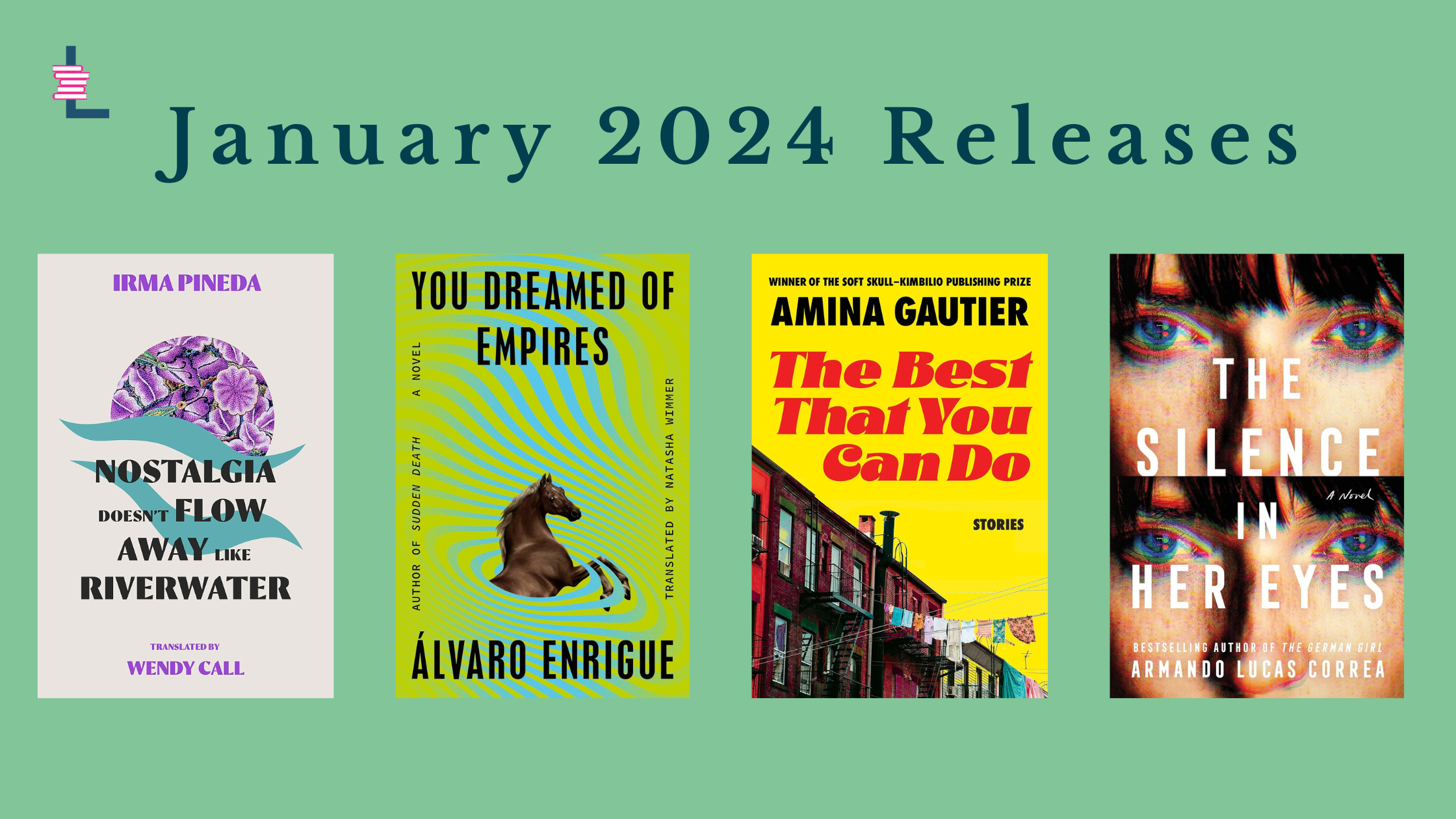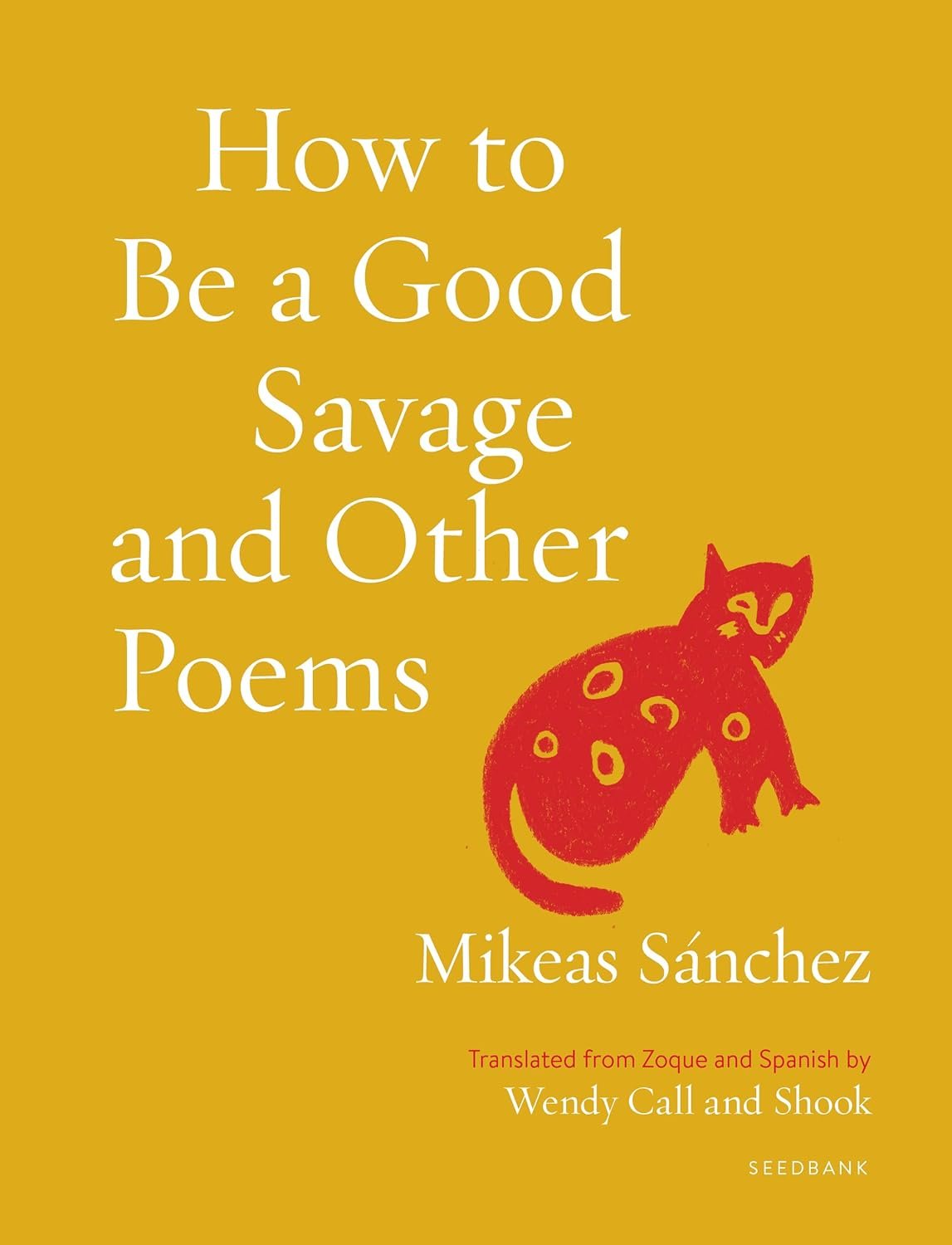On Sale January 9
How to Be a Good Savage and Other Poems by Mikeas Sánchez | Translated by Wendy Call & Shook | POETRY
In a fiercely personal yet authoritative voice, prolific contemporary poet Mikeas Sánchez explores the worldview of the Zoque people of southern Mexico. Her paced, steely lyrics fuse cosmology, lineage, feminism, and environmental activism into a singular body of work that stands for the self and the collective in the same instant. “I am woman and I celebrate every vein,” she writes, “where I guard my ancestors’ secrets / every Zoque man’s word in my mouth / every Zoque woman’s wisdom in my spit.”
How to Be a Good Savage and Other Poems examines the intersection of Zoque struggles against colonialism and empire, and those of North African immigrants and refugees. Sánchez encountered the latter in Barcelona as a revelation, “spreading their white blankets on the ground / as if they’ll soon return to sea / flying the sail of the promised land / the land that became a mirage.” Other works bring us just as close to similarly imperiled relatives, ancestors, gods, and archetypal Zoque men and women that Sánchez addresses with both deeply prophetic and childlike love.
Coming from the only woman to ever publish a book of poetry in Zoque and Spanish, this timely, powerful collection pairs the bilingual originals with an English translation for the first time. This book is for anyone interested in poetry as knowledge, proclaimed with both feet squarely set on ancient ground.
You Dreamed of Empires by Alvaro Enrigue | Translated by Natasha Wimmer | ADULT FICTION
One morning in 1519, conquistador Hernán Cortés entered the city of Tenochtitlan – today's Mexico City. Later that day, he would meet the emperor Moctezuma in a collision of two worlds, two empires, two languages, two possible futures.
Cortés was accompanied by his nine captains, his troops, and his two translators: Friar Aguilar, a taciturn, former slave, and Malinalli, a strategic, former princess. Greeted at a ceremonial welcome meal by the steely princess Atotoxli, sister and wife of Moctezuma, the Spanish nearly bungle their entrance to the city. As they await their meeting with Moctezuma – who is at a political, spiritual, and physical crossroads, and relies on hallucinogens to get himself through the day and in quest for any kind of answer from the gods – the Spanish are ensconced in the labyrinthine palace. Soon, one of Cortés’s captains, Jazmín Caldera, overwhelmed by the grandeur of the city, begins to question the ease with which they were welcomed into the city, and wonders at the risks of getting out alive, much less conquering the empire.
Shut Up, This Is Serious by Carolina Ixta | YOUNG ADULT
Belén Dolores Itzel del Toro wants the normal stuff: to experience love or maybe have a boyfriend or at least just lose her virginity. But nothing is normal in East Oakland. Her father left her family. She’s at risk of not graduating. And Leti, her super-Catholic, nerdy-ass best friend, is pregnant—by the boyfriend she hasn’t told her parents about, because he’s Black, and her parents are racist.
Things are hella complicated.
Weighed by a depression she can’t seem to shake, Belén helps Leti, hangs out with an older guy, and cuts a lot of class. She soon realizes, though, that distractions are only temporary. Leti is becoming a mother. Classmates are getting ready for college. But what about Belén? What future is there for girls like her?
From debut author Carolina Ixta comes a fierce, intimate examination of friendship, chosen family, and the generational cycles we must break to become our truest selves.
On Sale January 16
The Best That You Can Do: Stories by Amina Gautier | ADULT FICTION
Primarily told from the perspective of women and children in the Northeast who are tethered to fathers and families in Puerto Rico, these stories explore the cultural confusion of being one person in two places—of having a mother who wants your father and his language to stay on his island but sends you there because you need to know your family. Loudly and joyfully filled with Cousins, Aunts, Grandparents, and budding romances, these stories are saturated in summer nostalgia, and place readers at the center of the table to enjoy family traditions and holidays: the resplendent and universal language of survival for displaced or broken families.
Refusing to shy away from dysfunction, loss, obligation, or interrogating Black and Latinx heritages “If we flip the channels fast enough, we can turn almost anyone Puerto Rican, blurring black and white into Boricua.” Gautier's stories feature New York neighborhoods made of island nations living with seasonal and perpetual displacement. Like Justin Torres’ We the Animals, or Quiara Alegria Hudes’ My Broken Language, it’s the characters-in-becoming—flanked by family and rich with detail—that animate each story with special frequencies, especially for readers grappling split-identities themselves.
The Silence in Her Eyes by Armando Lucas Correa | ADULT FICTION
Leah has been living with akinetopsia, or motion blindness, since she was a child. For the last twenty years, she hasn’t been able to see movement. As she walks around her upper Manhattan neighborhood with her white stick tapping in front, most people assume she’s blind. But the truth is Leah sees a good deal, and with her acute senses of smell and hearing, very little escapes her notice.
She has a quiet, orderly life, with little human contact beyond her longtime housekeeper, her doctor, and her elderly neighbor. That all changes when Alice moves into the apartment next door and Leah can immediately smell the anxiety wafting off her. Worse, Leah can’t help but hear Alice and a late-night visitor engage in a violent fight. Worried, she befriends her neighbor and discovers that Alice is in the middle of a messy divorce from an abusive husband.
Then one night, Leah wakes up to someone in her apartment. She blacks out and in the morning is left wondering if she dreamt the episode. And yet the scent of the intruder follows her everywhere. And when she hears Alice through the wall pleading for her help, Leah makes a decision that will test her courage, her strength, and ultimately her sanity.
Nostalgia Doesn’t Flow Away Like Riverwater by Irma Pineda | Translated by Wendy Call | POETRY
Nostalgia Doesn’t Flow Away Like Riverwater / Xilase qui rié di’ sicasi rié nisa guiigu’ / La Nostalgia no se marcha como el agua de los ríos is a trilingual collection by one of the most prominent Indigenous poets in Latin America: Irma Pineda. The book consists of 36 persona poems that tell a story of separation and displacement in two fictionalized voices: a person who has migrated, without papers, to the United States for work, and that person’s partner who waits at home, in the poet’s hometown of Juchitán, Oaxaca.
On Sale January 23
The Bullet Swallower by Elizabeth Gonzalez James | ADULT FICTION
In 1895, Antonio Sonoro is the latest in a long line of ruthless men. He’s good with his gun and is drawn to trouble but he’s also out of money and out of options. A drought has ravaged the town of Dorado, Mexico, where he lives with his wife and children, and so when he hears about a train laden with gold and other treasures, he sets off for Houston to rob it—with his younger brother Hugo in tow. But when the heist goes awry and Hugo is killed by the Texas Rangers, Antonio finds himself launched into a quest for revenge that endangers not only his life and his family, but his eternal soul.
In 1964, Jaime Sonoro is Mexico’s most renowned actor and singer. But his comfortable life is disrupted when he discovers a book that purports to tell the entire history of his family beginning with Cain and Abel. In its ancient pages, Jaime learns about the multitude of horrific crimes committed by his ancestors. And when the same mysterious figure from Antonio’s timeline shows up in Mexico City, Jaime realizes that he may be the one who has to pay for his ancestors’ crimes, unless he can discover the true story of his grandfather Antonio, the legendary bandido El Tragabalas, The Bullet Swallower.
Leonor: The Story of a Lost Childhood by Paula Delgado-Kling | ADULT NONFICTION
Paula Delgado-Kling takes us to her homeland, Colombia, where she finds answers to the country's drug wars by examining the life of Leonor, a former child soldier in the FARC, a rural guerrilla group.
Paula followed Leonor for nineteen years, from shortly after she was an active member forced into sexual slavery by a commander thirty-four years her senior, through her rehabilitation and struggle with alcohol and drug addiction, to more recent days, as the mom of two girls. Leonor's immense resourcefulness and imagination in the face of horrendous circumstances helped her carve a space for herself in the FARC, a world dominated by males. She is beautiful, and by honing her powers of seduction, Leonor created a parallel world where she made herself a protagonist. She never stopped believing that she was a woman of worth and importance. It took her many years of therapy to accept that she was a victim. For half a lifetime, she regarded herself as "the First Lady of the Southern Bloc," and exploited any power she fabricated for herself to stay alive.
Colombia's violence also touched Paula's family. This narrative began with the question: why was her brother kidnapped and why were his guards teenagers?
On Sale January 30
How We Named the Stars by Andrés N. Ordorica | ADULT FICTION
When Daniel de La Luna arrives as a scholarship student at an elite East Coast university, he bears the weight of his family’s hopes and dreams, and the burden of sharing his late uncle’s name. Daniel flounders at first―but then Sam, his roommate, changes everything. As their relationship evolves from brotherly banter to something more intimate, Daniel soon finds himself in love with a man who helps him see himself in a new light. But just as their relationship takes flight, Daniel is pulled away, first by Sam’s hesitation and then by a brutal turn of events that changes Daniel’s life forever.
As he grapples with profound loss, Daniel finds himself in his family’s ancestral homeland in México for the summer, finding joy in this setting even as he struggles to come to terms with what’s happened and faces a host of new questions: How does the person he is connect with this place his family comes from? How is his own story connected to his late uncle’s? And how might he reconcile the many parts of himself as he learns to move forward?
José Feeds the World: How a Famous Chef Feeds Millions of People in Need Around the World by David Unger | Illustrated by Marta Álvarez Miguéns | PICTURE BOOK
When a terrible earthquake hit Haiti in 2010, chef José Andrés knew he needed to help. Within a few hours of the disaster, he had gathered friends, they flew to the island, and they began cooking rice and beans for the hungry locals. This trip changed the life of the successful chef and led him to found World Central Kitchen, a disaster-relief organization that has fed more than 200 million people affected by natural disasters, the COVID pandemic, and war.
This beautifully illustrated book tells the story of a passionate chef who uses the power of food to nurture people in need, one plate at a time.

















